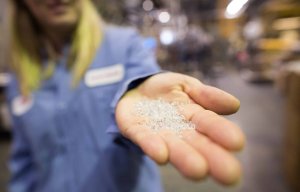
Polyester renewal plant up and running
Post-consumer carpet will now be recycled through Eastman's carbon renewal technology and converted into new materials to serve new and useful purposes.

5th November 2019
Innovation in Textiles
|
Kingsport, TN
"Our work with Circular Polymers will divert millions of pounds of carpet from landfills in the first year of our agreement," said Mark Costa, Eastman board chair and CEO. © Eastman.
Eastman has reached an agreement to give new life to one of the most problematic waste materials in US landfills. Post-consumer carpet will now be recycled through Eastman's carbon renewal technology and converted into new materials to serve new and useful purposes.
Eastman has partnered with Circular Polymers, a company that reclaims post- consumer waste products for recycling. Through this agreement, Eastman has secured a consistent source of feedstock for carbon renewal technology, an innovative chemical recycling method that recently began commercial operation at Eastman's primary manufacturing site in Kingsport, Tennessee.
"Our work with Circular Polymers will divert millions of pounds of carpet from landfills in the first year of our agreement," said Mark Costa, Eastman board chair and CEO. "Securing consistent sources of feedstock is an important element of our circular solutions platform, as it ensures we can provide Eastman customers with materials that contain certified recycled content. This is our first announcement on sourcing feedstocks for our chemical recycling technologies, and there will be more to come."
Carpet pulled from houses and commercial buildings is a particularly problematic landfill item because transport is not easy – carpet is heavy and bulky – and there is a lot of it. More than 3 billion pounds of carpet were sent to U.S. landfills in 2018, according to Carpet America Recovery Effort (CARE).
Under this agreement, Circular Polymers will collect polyester carpet from homes and businesses and recycle it at the company's California reclamation facility, where they utilize a unique processing technology that efficiently separates the PET fibre from the carpeting.
Circular Polymers densifies the fibre, which enables its efficient transport by railcar to Eastman's Tennessee manufacturing site for chemical recycling, where it will produce new materials with certified recycled content. Those materials will be used to produce products used in Eastman markets, including textiles, cosmetics and personal care, and ophthalmic.
"We are excited to collaborate with Eastman on a project that benefits the planet," said David Bender, CEO of Circular Polymers. "Congratulations to Eastman on their leadership in the circular economy and upcycling carpet." CARE, a non-profit created to support and facilitate market-based solutions that keep carpet out of landfills, partnered with Eastman and Circular Polymers to facilitate the agreement. Since its founding in 2002, CARE has diverted more than 5 billion pounds of carpet from landfills.
"CARE is proud to be part of the team bringing a solution for waste carpet to the marketplace," said Robert Peoples, executive director of CARE. "Eastman and Circular Polymers moved quickly from idea to implementation, and this is a win for all involved."
This announcement comes less than a year after Eastman first announced its intention to prioritize meaningful contributions to the circular economy.
"We're a company committed to immediate, substantive action to support a circular economy," said Steve Crawford, Eastman senior vice president, chief technology and sustainability officer. "Finding new value in old carpet is something we can all appreciate and relate to. If we just discard the carpet and landfill it, then it's as if the valuable resources it took to make that carpet are locked up and no longer useful. Eastman is also committed to changing that story for multiple sources of mixed plastic which now are being landfilled. By collaborating with feedstock providers like Circular Polymers and others across the value chain, we are going to work together to reclaim the value of our resources."
Eastman expects to use up to 50 million pounds of waste plastic in carbon renewal technology operations in 2020, and projects are currently underway to significantly expand that amount.
"In addition to other feedstock agreements like this one, we are also developing takeback programs in partnership with strategic customers to supply additional feedstocks for our innovative recycling technologies," Crawford said. "Our carbon renewal technology is already operating at commercial scale capacity, so we are actively pursuing additional feedstock opportunities to realize a material impact as quickly as possible."

Business intelligence for the fibre, textiles and apparel industries: technologies, innovations, markets, investments, trade policy, sourcing, strategy...
Find out more